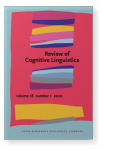Everyone “leaves” the world eventually
Culture-based homogeneity and variation in death is departure
What causes metaphors to be similar or different across languages? It can be tempting to associate differences with culture and similarities with embodiment, since human cultures are diverse and human bodies are comparable. However, we argue that the death of a loved one is such a widespread experience that it forms part of every human culture. We argue that linguistic instantiations of death is departure tend to focus on the starting point of the deceased person’s journey and the arrival of the person’s remains in their final resting place. We attribute these trends to the fact that living people around the world are focused on their loved ones’ absence in the here-and-now, and living people often place importance on physical sites associated with deceased loved ones, such as the location of their remains. These cross-linguistic trends emphasize that culture can lead to similarities as well as differences in metaphoric structures.
Article outline
- 1.Cognitive universals and cultural variation
- 1.1Structure of the paper
- 2.The Source of the voyage in death is departure
- 3.
Going to Heaven, eternity, or another Goal
- 4.How do we “get there”? The path in death is departure
- 5.When the body is a container
- 6.
Going to one’s grave as a conceptual blend
- 7.Conclusion: To what extent are we all going together?
-
References
References
Adair, L.
(
2015)
The D.C. connection. Bloomington, IN: Xlibris Corporation.

Biela-Wołońciej, A.
(
2013)
“Death is -the essence of all evil” – but not equally everywhere: Polish-English study on valuing and masking.
Intercultural Pragmatics, 10(2), 235–264.


Berndt, R. M., & Berndt, C. H.
(
1964)
The world of the first Australians. Sydney: Ure Smith.

Dąbrowska, A.
(
1998)
Słownik eufemizmów polskich: Czyli w rzeczy mocno, w sposobie łagodnie. Warsaw: Wydawnictwo Naukowe PWN SA.

Edwards, B.
(
2013)
Changes in Pitjantjatjara mourning and burial practices.
Australian Aboriginal Studies, 11, 31–44.

Fauconnier, G., & Turner, M.
(
2002)
The way we think. Conceptual blending and the mind’s hidden complexities. New York, NY: Basic Books.

Fauconnier, G.
(
1997)
Mappings in thought and language. Cambridge: Cambridge University Press.


Gibbs, R. W. Jr.
(
2006)
Embodiment and cognitive science. Cambridge: Cambridge University Press.

Gibbs, R. W. Jr., & Colston, H. L.
(
1995)
The cognitive psychological reality of image schemas and their transformations.
Cognitive Linguistics, 61, 347–378.


Grady, J. E.
(
1997)
Foundations of meaning: Primary metaphors and primary scenes. PhD Dissertation, University of California at Berkeley: Department of Linguistics.

Grady, J. E., & Johnson, C.
(
2002)
Converging evidence for the notions of subscene and primary scene. In
R. Dirven &
R. Pörings (Eds.),
Metaphor and metonymy in comparison and contrast (pp. 533–554). Berlin & New York: Mouton de Gruyter.


Greenberg, J., Pyszczynski, T., & Solomon, S.
(
1986)
The causes and consequences of the need for self-esteem: A terror management theory. In
R. F. Baumeister (Ed.),
Public self and private self (pp. 189–212). New York, NY: Springer-Verlag.


Ibarretxe-Antuñano, I.
(
2013)
The relationship between conceptual metaphor and culture.
Intercultural Pragmatics, 10(2), 315–339.


Johnson, M.
(
1993)
Moral imagination: Implications of cognitive science for ethics. Chicago, IL: University of Chicago Press.


Kaberry, P. M.
(
1939)
Aboriginal woman sacred and profane. London: G. Routledge and Sons.

Kövecses, Z.
(
2005)
Metaphor in culture. Universality and variation. Cambridge & New York: Cambridge University Press.


Lakoff, G., & Johnson, M.
(
1980)
Metaphors we live by. Chicago, IL: University of Chicago Press.

Lakoff, G., & Turner, M.
(
1989)
More than cool reason: A field guide to poetic metaphor. Chicago, IL: University of Chicago Press.


Lakoff, G.
(
1987)
Women, fire and dangerous things: What categories reveal about the mind. Chicago, IL: University of Chicago Press.


Pound, L.
(
1936)
American euphemisms for dying, death, and burial: An anthology.
American Speech, 11(3), 195–202.


Quinn, N.
(
1991)
The cultural basis of metaphor. In
J. Fernandez (Ed.),
Beyond metaphor. The theory of tropes in anthropology (pp. 56–93). Stanford, CA: Stanford University Press.

Thomas, D.
(
1952)
The Poems of Dylan Thomas. New York: New Directions Publishing Co.

Tu, B. D., & Wang, G. N.
(
2013)
A comparative study on “death” terms in Chinese and Vietnamese. In
P. Liu &
Q. Su (Eds.),
Chinese lexical semantics 14th workshop, CLSW 2013 (pp. 117–125). Berlin & Heidelberg: Springer-Verlag.

Wachowski, W.
(
2017)
Metonymic hiding and cross-cultural communication. In
W. Wachowski,
Z. Kövecses, &
M. B. Zooming (Eds),
Micro-scale perspectives on
cognition, translation and cross-cultural communication (pp. 33–53). Oxford: Peter Lang.

Wachowski, W.
(
2018)
Towards a better understanding of metonymy. Oxford: Peter Lang.

Whittier, J. G.
(
1866)
Snow-bound: A winter idyl. Boston, MA: Ticknor & Fields.

Cited by
Cited by 1 other publications
Wachowski, Wojciech & Karen Sullivan
2020.
Why Would We Rather Peg Out Than Simply Die?—How Do game Metaphors Help Us Deal with Death Across Languages and Cultures?. In
Cultural Conceptualizations in Language and Communication [
Second Language Learning and Teaching, ],
► pp. 25 ff.

This list is based on CrossRef data as of 17 april 2022. Please note that it may not be complete. Sources presented here have been supplied by the respective publishers.
Any errors therein should be reported to them.
